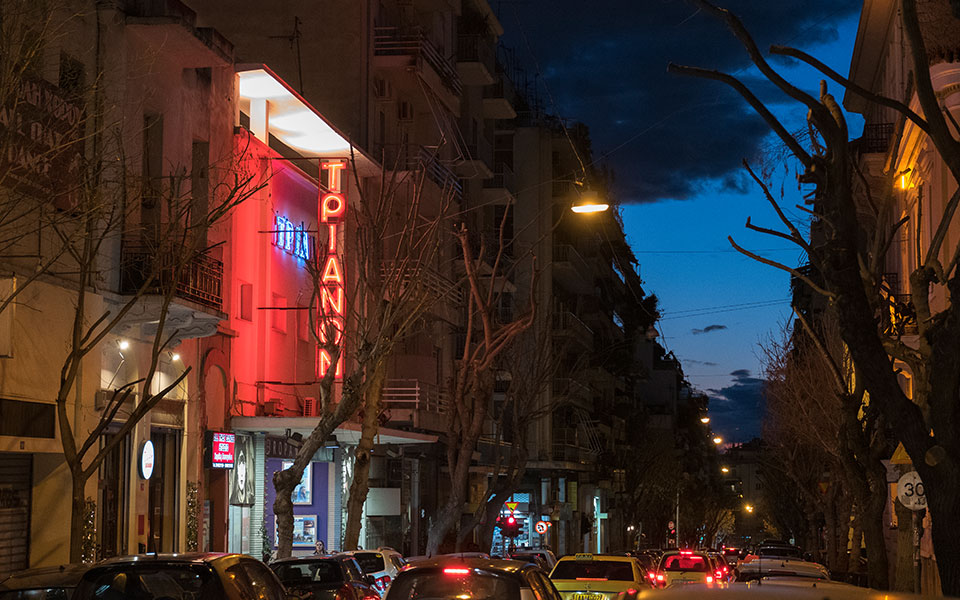It’s no wonder director David Cronenberg chose the Greek capital as a backdrop for his recent film Crimes of the Future: its urban decadence among ancient ruins embodies the filmmaker’s retro-futuristic aesthetic. One of the locations, the 1930s Iris Film Theater, is just one of a remarkable number of historic movie halls still operating in Athens, at least for now – “Far less than 50 years ago,” says Dimitris Fyssas, author of The Cinema of Athens 1896-2013, “but certainly more than any other city today.” Beyond the romance and drama projected on their screens, these dream palaces have played parts in true stories of revolution and war, culture and community.
Yet the last curtain calls for these time capsules of modern Greek history may be close at hand: enduring through a century of turmoil and instability – including WWII, a military dictatorship, and the latest economic crisis – there is no telling how long they will resist the lure of gentrification and development being propelled by the recent rise in tourism and foreign investment.
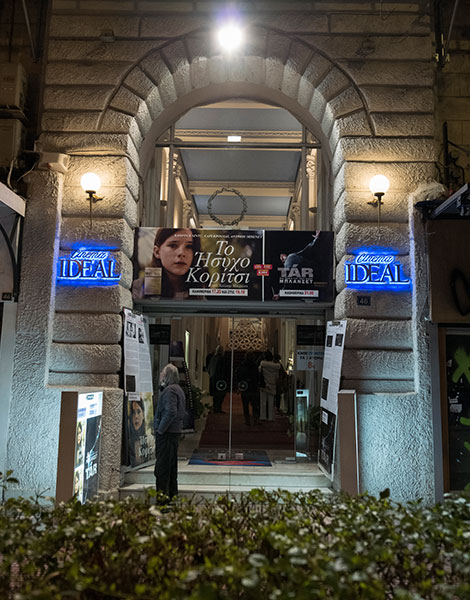
© Vangelis Zavos
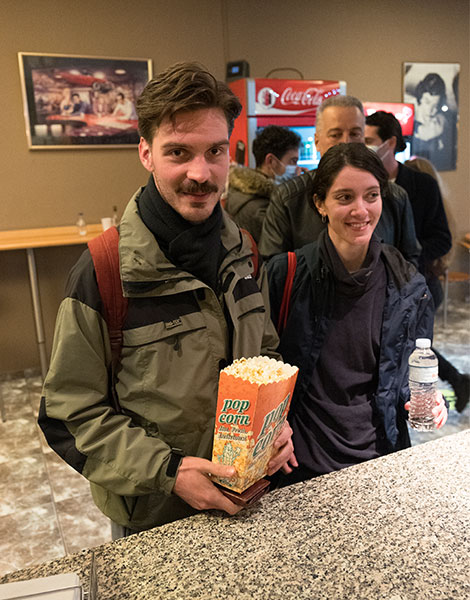
© Vangelis Zavos
Celebrating its 100th anniversary in 2022, Cine Ideal was the first to bring Dolby Stereo sound to Greece. It once boasted the largest screen in Europe, according to Alexander Spentzos, who runs it with his brothers, George and Spiros. Their father Christos owned Spentzos Films, producer of countless classic films, including the slapstick comedy Το Στραβόξυλο (1952), which every Greek has certainly seen more than once. “My father was a pilot fighting the Germans in Egypt during the day and shooting film at night,” Spentzos says. George Polyzoides remembers skipping school at Ideal on Monday mornings in the 1950s to catch the first showing of the new Brigitte Bardot films, before the censors had the chance to cut out the “fleshy” scenes – the theater was full of schoolboys, their book bags strewn down the aisles. Watching a movie there is still a thrill; the gigantic screen is mesmerizing, and the vast array of 750 seats more impressive than ever, even if the upholstery is now a bit threadbare.
Cine Ideal came under threat of closure recently when its building lease was auctioned off to Mitsis Hotels by the previous owner, EFKA (National Social Security Agency). Initial reports stated that Ideal would be demolished. Soon to be sold are the Astor, in the nearby arcade known as Stoa Korai, and Aello, also owned by EFKA. Public outcry prompted a unanimous vote by the Athens city council, in November 2022, to preserve the three properties for use as cinemas; it was argued that they were “crucial to the character, memory, and cultural wealth of the city.” Until now, Cine Ideal had been paying rent based on a percentage of ticket sales; it is uncertain whether the new proprietor will charge an affordable rate.
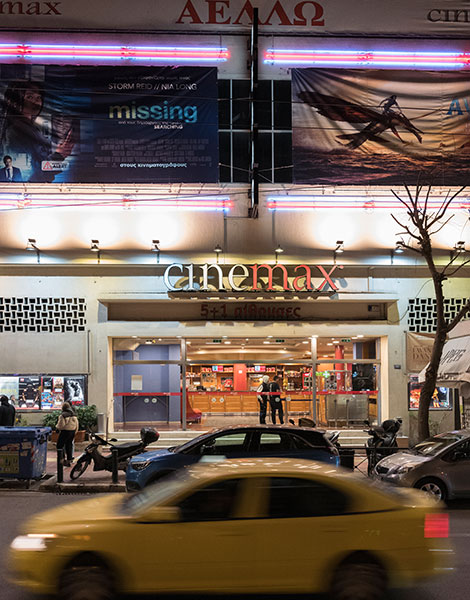
© Vagelis Zavos
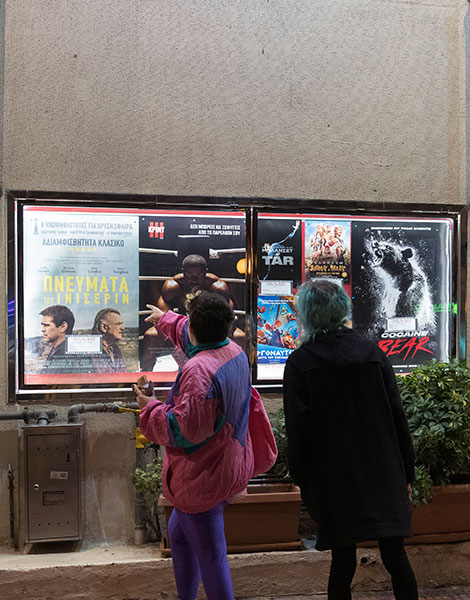
© Vagelis Zavos
These places represent a unique type of architecture, as temples of a sort to the heyday of film, when celluloid reels spun beguiling illusions that seemed incredible, yet real. Aello was first established as a summer cinema in 1939, and added an indoor screen by the mid-1960s, when Fokionos Negri was a fashionable nexus of urban nightlife, referred to as the Via Veneto of Athens. “Every block on Patision had a movie theater, and my dad, the actor Nikos Tsoukas, would sometimes go to three films a night,” composer Dimitris Tsoukas says. Among those still in operation are the Alexandra and Trianon, the latter of which opened in 1960 with the premiere of Never on Sunday, attended by its star, Melina Mercouri, and Crown Prince Konstantinos.
It was the first theater in the city to have sloped seating, and its motorized retractable roof allows for viewing under the stars when weather permits. Trianon has been kept in the family, surviving through a low period in the 1980s; today, it’s managed by Maria Lyssikatou, the niece of its founder, Andrea Papageorgeou, and Michalis Zeis. Turned away from a sold-out showing of Wes Anderson’s Grand Budapest Hotel one Saturday night in Kolonaki, we raced across the city to catch the same film at the Alexandra, where we had the place practically to ourselves. It was a serendipitous escapade: the theater’s vintage red décor seemed part of the film set.
Over the years, some of the cinemas have switched to live theater or pornography to keep going. The iconic Rex – an Art Deco building constructed in 1935 to house a cinema, theater, and ballroom – was declared a historic monument after its damage by fire in 1982 and has been used since as a venue for the National Theater. The ceiling features an unforgettable circular mural, painted by Yiannis Tsarouchis and his students, of buff male laborers looking down on the audience from above, evoking a kind of modern Sistine Chapel.
Next door was the 2,000-seat Titania, from the same period, now a hotel of that name. The interior of the Iris Film Theater recalls a Gothic cathedral, with ghostly faces watching from florid plaster friezes; cinephiles have flocked here since the 1980s to attend seminars and screenings offered free to the public by the student cultural club of the University of Athens Film Department.
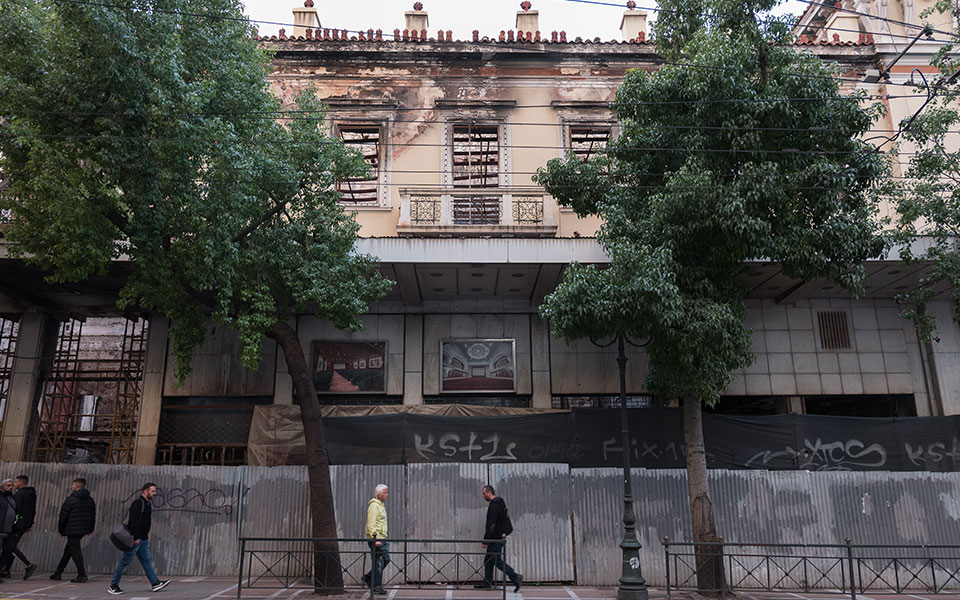
© Vangelis Zavos
On Voukourestiou Street, the elegant Parisian-style Pallas, originally boasting 2,500 seats, is where the upper classes met on Saturday nights after WWII and the Greek Civil War to see films starring Doris Day and Rock Hudson. It now hosts live performances. Opened in 1912, the stately Attikon – housed in a neoclassical building designed by Ernst Ziller, with a dazzling chandelier evoking the golden days of movie palaces – survived occupation by the Nazis (when it was renamed Soldaten Kino Victoria) and the torching of the bank next door by anarchists in 2010, only to be destroyed by petrol bombs in a riot exactly 100 years after its opening. Rumor has it that it’s only the entrance to the building that is damaged, and that the theaters, including the basement-level Apollon, are still fully intact. Although the owner, Cinemax, sends out periodic announcements declaring its imminent revival, the corner building remains fenced off, a mute memorial to the days of stylish glory when glamorous Hollywood stars ascended its white marble staircase. Polyzoides remembers watching the first film released in CinemaScope, The Robe (1953), starring Richard Burton and Victor Mature, at this cinema and thinking that the horses were coming right out of the screen into the auditorium. (The last film to be shown there was 2011’s Tinker Tailor Soldier Spy.)
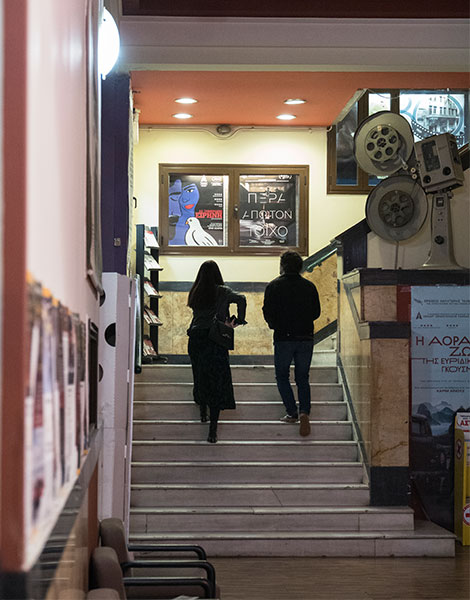
© Vangelis Zavos
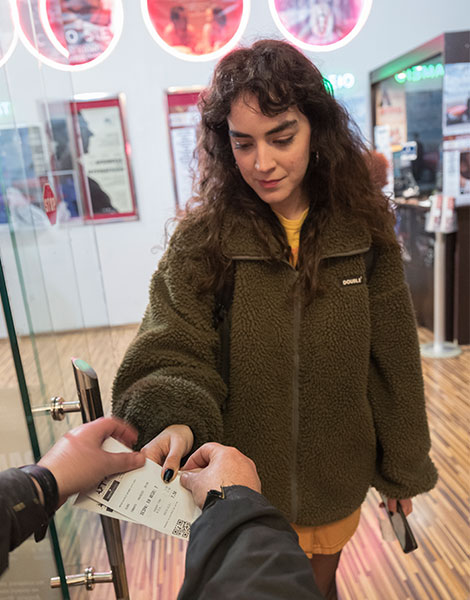
© Vangelis Zavos
The building that houses Cine Asty still contains bomb shelters repurposed by the Nazis for use as an interrogation and detention center that processed more than 1,000 prisoners. It is now a museum called Korai 4, where graffiti by former inmates is preserved on the walls. A dining room and a hockey rink used by the Germans still lie, neglected, behind locked doors. Opened in 1939, the movie theater retains its original seating, arranged between massive columns. In the lobby, you can sift through piles of fabulous movie posters, on sale for as little as €1.
Brothers Dimitris and George Stergiakis, heads of AMA Films and sons of the late great film distributor Antonis, have managed Asty for the past 19 years. “It’s a very difficult situation now for the art house cinemas in Greece, but we are fighters,” says Dimitris. “It’s a small group of people who come to the movies.” In 2014, the Stergiakis brothers revived the gorgeous Petit Palais, on a corner of Rizari in Pangrati, until the landlord raised the rent too high, and COVID hit. Fans of filmmaker Yorgos Lanthimos from the start, they were the first to screen the controversial film Dogtooth in Greece, after having seen it in Cannes. “They are heroes,” says Rania Psimenou, who coproduced Women Who Passed My Way, the last film of Stavros Tsiolis.
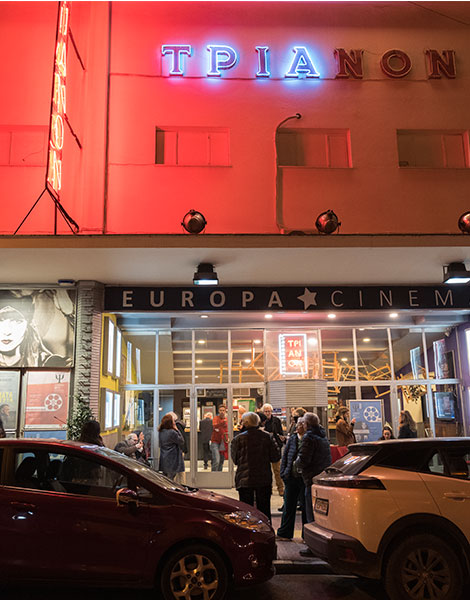
© Vangelis Zavos

© Vangelis Zavos
Pangrati’s Ciné Palas kept its doors open for nearly a century thanks to Mathaios Potagas, whose father and uncles built it in 1925. He took over operations in 1953, manning the projector and snack bar while his sister, Eleni, sold tickets; he kept this up until his death in 2021, at the age of 94. Despite dwindling audiences, Potagas kept the lights on out of sheer passion: “I have been offered lots of money from developers to make it into shopping malls or a casino,” he once told me. Standing in the auditorium as he spoke, he waved his hand across the waves of seats, the upholstery faded to various shades of red, and pointed out the place that had been specially reserved for King Pavlos during his reign. He also told me how the cinema saved his life during the occupation. One day in August 1944, while Potagas and his cousin were watching a movie, German soldiers arrived and threw them in the back of a truck to be sent off to a labor camp. A Greek government official among the captives protested, “This is a very important person you have here – he runs the cinema!” So they let him go, but his 18-year-old cousin was not so lucky.
It is not clear what the future holds for the Cine Palas. For now, Maria Lyssikatou and Michalis Zeis of Trianon are operating the open-air theater. “We have updated the equipment with a digital projector and Dolby 5.1 sound system – I’d say we have the best sound you can hear in the summer cinemas,” Zeis says.
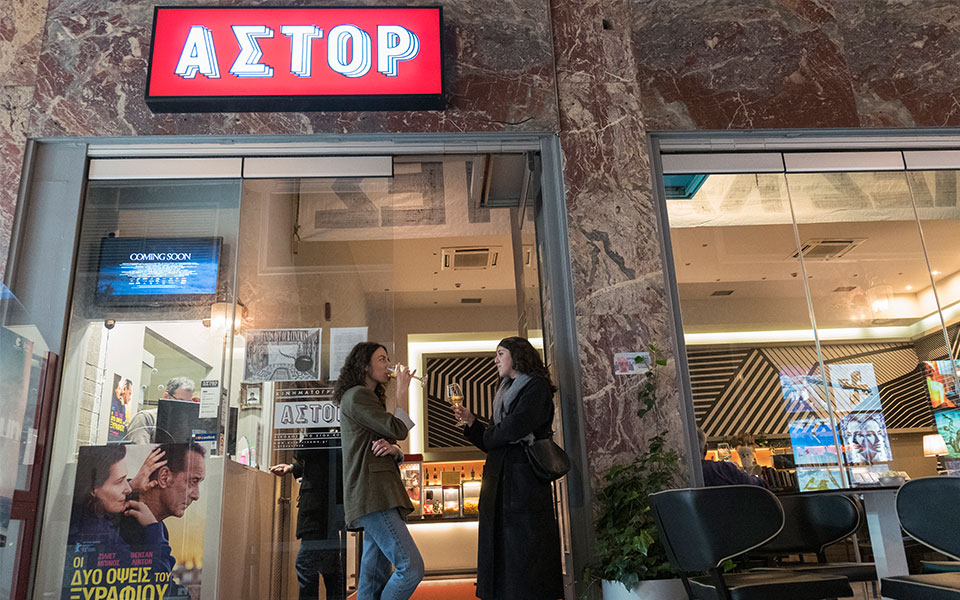
© Vangelis Zavos
As culture minister, Melina Mercouri initiated a resolution that was passed in 1997, after her death, to protect 47 of the city’s open-air cinemas, including the Cine Palas, as cultural monuments. This complicates any plan for development of the building itself. Its café-style rooftop theater is famous for its neon-framed screen, with the ΠΑΛΑΣ logo in the center, and the water fountains spurting up from behind well-manicured bushes. Aside from the update in projection technology, the Art Deco theater has remained virtually unchanged over the decades, and today it would cost more than €1 million to get it back in working order. “It’s not an investment that will yield a return in the short term, so we’re waiting to see if it can be done with a subsidy from the European Union or the Greek state,” Zeis notes.
Cinema audience numbers have dropped worldwide since the advent of television and digital media, but these Athenian movie houses have staved off closure through the efforts of a group of dedicated cinephiles. It may also be that both conflict and economic crisis, or at least the lack of development, have actually protected the big screens up to now. However, numbers have still not recovered post-COVID: “With few exceptions, like the new Avatar film, admissions are down by 50 to 70 percent here, as well as across the whole planet,” Zeis says. Last year, only about 5,400,000 tickets were sold in Greece; this compares poorly to 2017-19 figures, which saw an average of around 9 million viewers annually, according to a report from the Greek film website Flix.
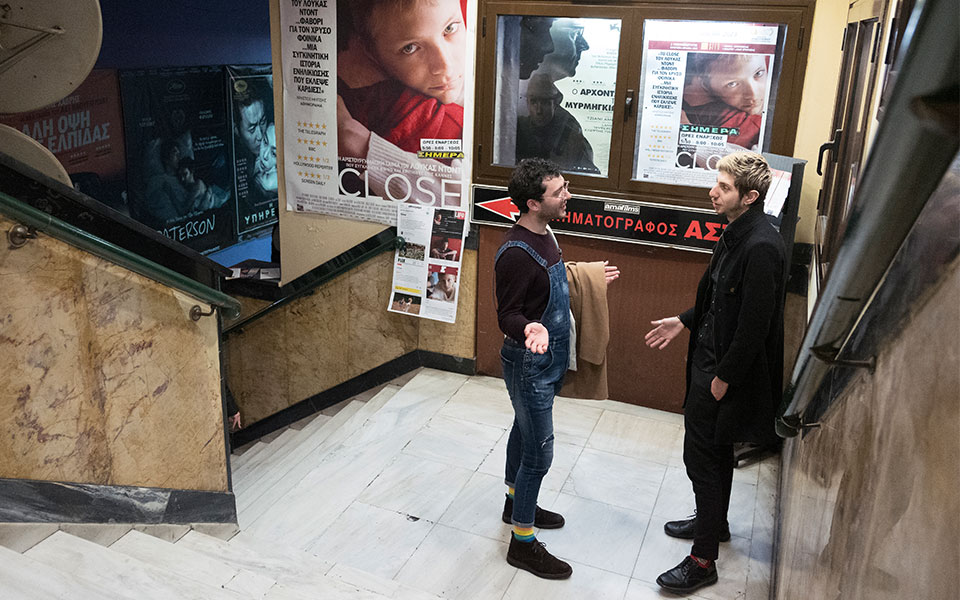
© Vangelis Zavos
There will always be summertime: Greece did not have TV until the 1970s, and then its broadcast was controlled by the junta. Mobile movie vans would travel from village to village, and Saturday was the big night out. The pioneer of Athenian al fresco projection was Cine Paris, opened by a hairdresser in 1920, and just recently closed, with views of the Acropolis so stunning that they competed with the on-screen action. The elegantly dressed lady selling tickets at Cine Oasis, hidden away in a verdant Pangrati courtyard, could be a character straight out of a Fellini film. Among the photographs of blonde starlets on the wall behind the ticket booth is a portrait of her fluffy white dog.
One of my favorite movie memories is watching La Dolce Vita on the rooftop of the Greek Film Archive, where echoes of the sultry Athenian streets wafted up from below to intermingle with the sounds of 1960s Rome. There’s no substitute for getting lost in the cosmos of the big screen surrounded by strangers, or for the ritual of eating popcorn out of a paper box – finished almost before the previews end and the film begins. Greeks of all ages love to go out and take their place among the buzz of the crowd, as evidenced by the city’s thriving, vibrant café culture – so there’s still hope for our silver screens.

